The activists confronting period taboos in Pakistan
Facing threats and alienation, women push for menstrual awareness in a country where women’s health taboos limit rights.
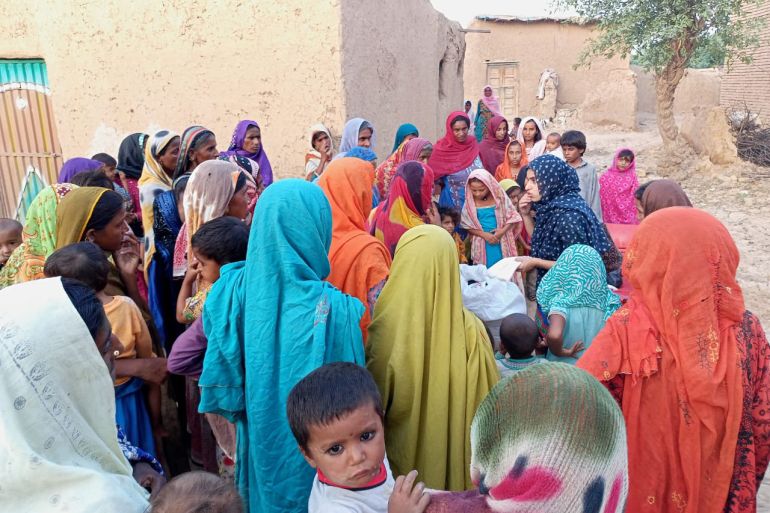
Thul, Pakistan – In November last year, I met Razia* at a rice mill in Thul, a little over an hour from Jacobabad city in Sindh province. An international aid agency was distributing care packages there among families from the district who had been affected by the floods that raged through the province in the summer of 2022. Razia, her head covered with a red dupatta with white embroidery along its border, had a small face, her eyes lined with kajal and a gold piercing hugged the curve of her nose. Its little gold beads shivered as she shook her head when I asked how old she was. She eventually guessed 25, but she looked younger. She had four children.
When the waters entered their village, many people left their homes and sought shelter on the nearest main road. They squatted there in makeshift tents or under the open sky as it continued to rain. I asked Razia about the days on the road. How had she managed with her children? She stared at me. I had asked a silly question.
Keep reading
list of 4 itemsTen years after Chibok girls kidnapping: One woman’s struggle to move on
Poland lawmakers take steps towards liberalising abortion laws
Arizona’s top court allows near-total 1864 abortion ban to go into effect
“My husband brought a plastic sheet and some sticks home and told me to make some sort of shelter for me and the children,” she said. “He did not let me leave our home.” She had to use the sheet to cover their heads as rain poured in through the thatched roof. The water entered their home. Still, they could not leave. Razia’s husband said there were too many men on the road, from their village and the ones around them. It was out of the question to go live among them, no walls separating the men and women. “Our men do not allow us to leave home like that,” Razia said.
The monsoon season last year, from June to September, saw record-breaking rainfall. August saw three times as much rainfall as the 30-year national average. Sindh and Balochistan provinces were the worst hit. Sindh, home to 50 million people, received eight times its average rainfall. More than 33 million people were affected by torrential rains and flash floods – that’s one in seven Pakistanis. The United Nations Secretary-General Antonio Guterres described it as a “monsoon on steroids”. “One-third of Pakistan is under water,” said the federal Minister for Climate Change Sherry Rehman at the time.
Pakistan needed help on an unprecedented level. The United Nations called for $816m in relief by October. In November, when I visited villages in Sindh and Balochistan, families were still crowded by the side of some main roads under worn tents bearing the names of aid organisations. As large local and international organisations, usually helmed by local male coordinators on the ground, assessed the needs of millions, others wondered about women like Razia. In September, an estimated 73,000 women were expected to give birth. They required birth attendants, newborn care and support, but many women were not allowed to leave their homes and were dependent on husbands or fathers to provide access to healthcare, or to travel with them to medical camps. And then there was the question of more basic needs: How were the 8.2 million women of reproductive age living in the flood-affected areas managing their menstrual needs? Who was considering this?
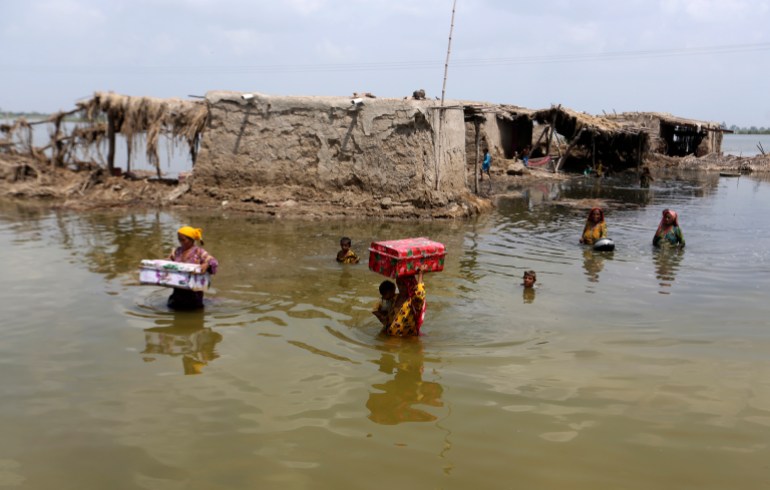
Mahwari Justice
In July, Anum Khalid, a 24-year-old architectural engineering student in Multan, a city in southern Punjab province, posted a message on Facebook asking for help in gathering relief supplies. “I asked for any donations or help with period products,” Anum recalled.
She shortly received a reply from Bushra Mahnoor, 22, a psychology student at a university in Lahore. The two had never met. “Let’s do this together,” Bushra wrote.
During the floods in 2010, the last time Pakistan had experienced anything close to the current disaster, 10-year-old Bushra had visited a relief camp in the town of Khairabad with her mother who volunteered to help out. A girl with blood stains on her clothes walked by them. She had just started her first period and said no one had explained what was happening to her body. She did not know about menstruation and did not have any supplies. The adults around her at the camp were frenzied as they sought help or shelter. Bushra could not stop thinking of that girl.
Bushra and Anum decided to set up a group to appeal for menstrual hygiene supplies like pads and underwear. They packed the supplies and coordinated with local aid groups to get the kits to the women in Sindh and Balochistan. They named the group “Mahwari Justice” – “mahwari” means menstruation in Urdu – and made a GoFundMe page and Twitter account.
When they contacted men coordinating relief efforts in both provinces, they often received the same reply: “Bibi [madam], we don’t want to do this kind of work with you.” The men wanted nothing to do with the period supplies.
Bushra and Anum reached out to their own contacts and found other aid workers who were willing to help them speak with women in camps and villages. They learned they were using whatever they could find during their period: sand, dried leaves, cow dung, and cloth. In places with standing water, they had nowhere to wash or dry the cloth. They spoke with a mother in Lasbela whose daughters had shared the same rag.
In the past, Anum had worked with the trans community in Multan as an activist. Now, trans activists reached out to her and offered a space for Mahwari Justice to do their work and store donations. Members of the trans community joined local volunteers – including fathers and daughters, husbands and wives, and young women – to pack kits. Through midwives and doctors travelling to the affected areas, and local contacts coordinating small-scale relief work, Bushra and Anum sent hygiene kits with pads, underwear, soap and detergent to 3,000 women in Balochistan within a few weeks.
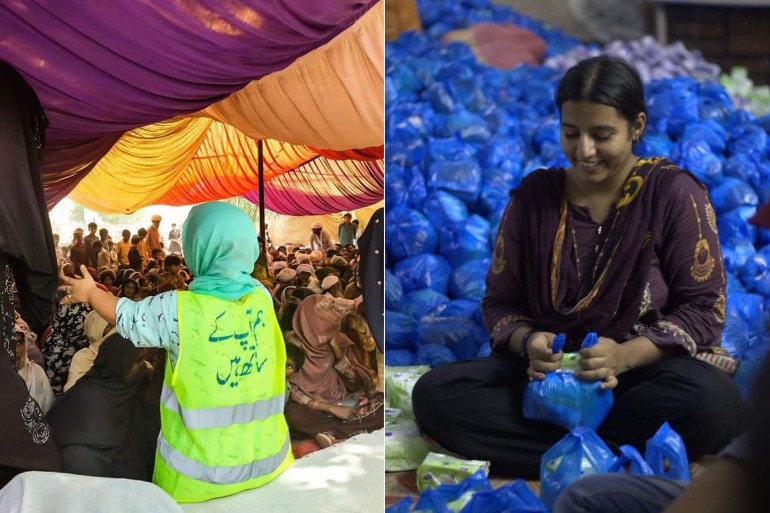
Creating hygiene kits
Menstrual hygiene management (MHM) has been noted as an important part of relief efforts by international aid organisations for some time now. The United Nations Population Fund has emphasised the provision of “dignity kits” – such as the ones Bushra and Anum were providing – to adolescent girls and women in humanitarian crises. Meanwhile, the Sphere Standards, a key humanitarian reference, reaffirmed the need to include menstrual health in any assessment of needs after a disaster. MHM includes access to safe and private latrines and clean water, sanitary materials such as cloth or pads, and means of disposing of those materials.
Bushra and Anum considered the first batch of kits they sent with commercial pads an “emergency response”. As they prepared for the second round, they spoke with relief workers and gynaecologists to better understand women’s needs. They never presumed. “I never thought that I, a young woman in a university dorm in a major city, would understand what a woman affected by the floods in rural Sindh might want,” Bushra explained.
To counter criticism that women wouldn’t know how to use pads, they created a printed infographic explaining how to use and dispose of pads and added it to each kit. After activists and aid workers connected them with women in camps or at medical clinics, they learned that some preferred reusable and washable cotton sheets or towelling fabric with a drawstring. They uploaded videos on Twitter showing people how to put a kit together to encourage independent donations. Eventually, they created four types of kits based on conversations with women in the affected areas. As winter approached, they added shawls, sweaters and socks to the kits. When Bushra met a woman at a camp in Balochistan who requested a comb, they decided to add a sewing kit, comb and mirror to the packages.
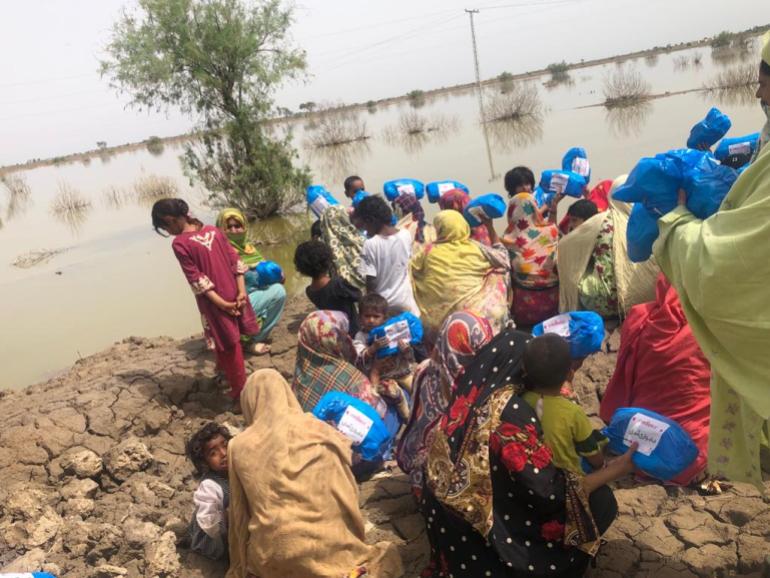
The backlash
Mahwari Justice was not the only organisation working on such aid. But Bushra and Anum quickly became the target of criticism and anger on social media as their appeals for donations were shared widely and they were featured on international media outlets. People were angry they were focusing on menstrual health.
“Shouldn’t food be a priority? Thanks for helping out but I see an agenda here,” someone said on Twitter.
They were mocked as elitist young women with the wrong priorities, with some comparing pads to shaving kits or condoms, saying they were not the need of the hour.
“While people are dying for food and shelter, you are trying to shove your idea in the throats of rural women.”
“Imagine having half your family dead due to floods, you are starving, and some girl gives you a panty and all is saved.”
They were also criticised for “spoiling” women who may never have used pads before, making them dependent on products and doing away with “traditional” means of managing their period, and contributing to environmental pollution in the area as the pads would not be disposed of properly.
The anger spilled over from online spaces into their lives. One of Anum’s thesis supervisors, who was also a doctor, was dismissive. “What is the need to do this?” she demanded. Anum stayed quiet, as she was worried her grades would be affected if she responded.
One evening, Bushra, who lived in a college dorm, received a call from her mother. She was furious.
Her mother demanded to know what she was thinking.
Bushra and Anum had not discussed their work with their families. Bushra pretended she did not know what her mother was talking about. But it was too late – her mother had seen her on a local news channel and was appalled.
“My mother said that I would be responsible if my four sisters did not get a good rishta [proposal] in the future,” Bushra recalled. “She said I would also not be eligible for a good proposal if I kept this up.”
She wanted to know how Anum had become so brazen and objected that Anum had never asked her permission to do this.
Anum’s mother insisted that they change the name of their organisation. “She said we were shameless for using the word ‘mahwari’,” Anum explained. “She threatened to kick me out of the house. She told me I could not come home unless we changed the name.”
Bushra’s father refused to speak to her for months.
Their critics discussed Mahwari Justice’s work as if Bushra and Anum were prioritising menstrual hygiene over other needs in the flood-affected areas. There were outraged debates on social media questioning whether women in these areas needed this kind of help. “Urban-dwelling women who have had no regular, prolonged interaction with women who live in the countryside are making assumptions about their needs,” wrote one male reporter who covered the debate.
They could not understand why their work was provoking such a reaction. “I felt really isolated,” Bushra recalled. “There was the backlash from society and our own families did not support us.” She and Anum turned to each other for support. “Our sisterhood is what sustained us.”
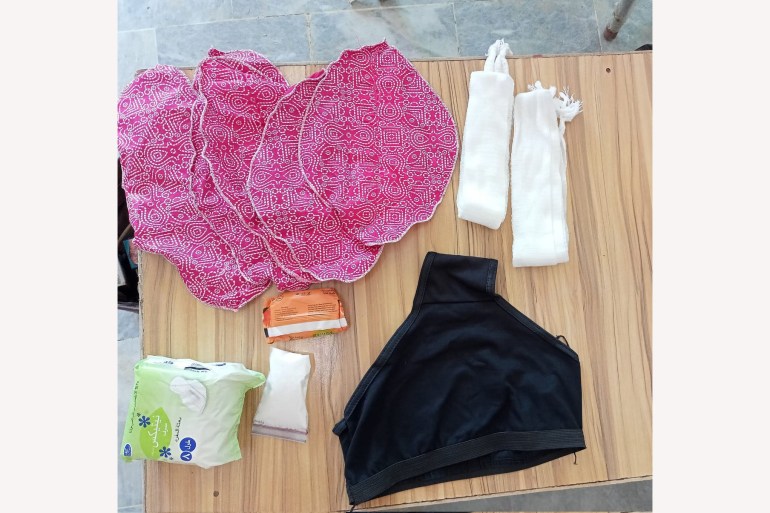
Stigma around reproductive health
Dr Mohsina Bilgrami graduated from medical school in 1977 with a specialisation in gynaecology. It would be 14 years before she was taught how to insert an IUD, a small T-shaped device inserted into the uterus to prevent pregnancy. “In medical school, we were not taught about family planning,” she said. “The professors had to teach us about anatomy, but they told us to read up on our own.”
This squeamish attitude towards the body, and especially the female body, persists in colleges today, she said. Dr Bilgrami joined the Family Planning Association of Pakistan (FPAP) and founded the Pakistani chapter of Marie Stopes International (MSI), providing reproductive health and family planning services, in 1991. “My colleagues laughed at me,” she said. “It was kachra [rubbish] work according to them. They looked down on me.”
Her colleagues’ disdain was symptomatic of a continued disinterest in sexual and reproductive health, she said, and deeply rooted in a belief that such issues are shameful to discuss publicly. As a consequence, reproductive health is ignored, swept under the rug – and not just among doctors. In 1994, Pakistan’s first female prime minister, Benazir Bhutto, attended an international conference in Cairo on population and development. At the time, Pakistan’s population growth rate was more than 3 percent per year. Bhutto skirted any discussion of sex. “Our people … don’t know what sex is, so they don’t indulge in something they don’t know about,” she said. Her government would have nothing to do with “adultery, abortion, sex education and other such matters”. Nearly 30 years later, little has changed in the government’s attitude: In a country in which 3 percent of the national budget is allocated to health, the focus on women’s health can be judged by the fact that Pakistan’s maternal mortality rate is one of the highest in South Asia.
Dr Bilgrami has travelled across the country with MSI. The regressive attitudes she encountered about women’s health in the villages and cities were replicated at home. “One of my aunts was so nervous any time I stayed with her if I had my period,” she recalls. “She would tell me to wrap a pad in something and give it to her so she could burn it at night. She was terrified that one of the males of the house would see it.”
She is not surprised by the outrage that young women like Bushra and Anum have to face. It is not new. In 1953, when FPAP was set up to provide contraception, its white vans would be pelted with stones. MSI’s community workers initially wore uniforms with the organisation’s name, and two women usually went door-to-door in neighbourhoods. “They faced so much harassment and anger that we had to get rid of the uniforms, and we then started sending a man and woman together for their safety,” Dr Bilgrami said.
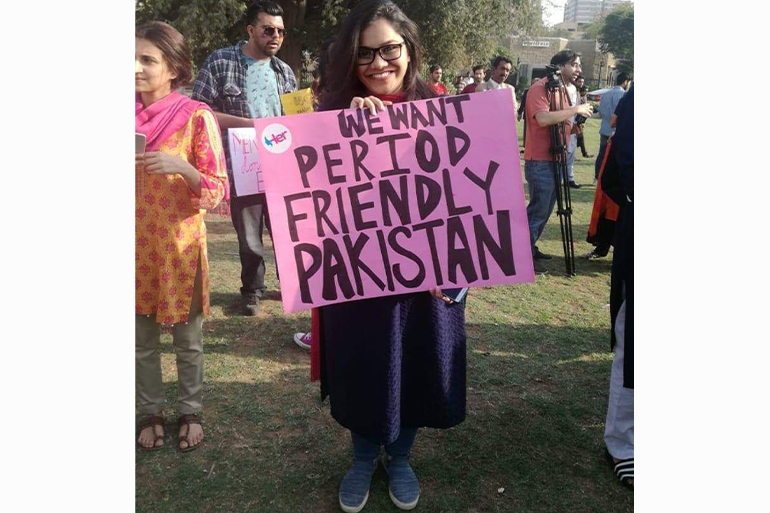
Bringing the discussion into the classroom
In 2019, 26-year-old Sana Lokhandwala attended the annual Aurat (Women’s) March in Karachi. She smiled brightly for a photograph as she held up a poster, its pink colour matching the dupatta she wore. “We want period friendly Pakistan,” her poster read in bold black letters. A few hours later, when she reached home, she checked her constantly-vibrating phone. A famous actor had posted her photograph on his Twitter to more than 700,000 followers and said, disgusted, “No brother can see this poster in the hands of his sister.” Sana’s inbox was filled with messages from men who threatened to rape or kill her. Four years later, her breath still catches and she speaks slowly as she recalls the comments.
The previous year, Sana had worked with a not-for-profit school in Karachi’s periphery, tasked with speaking with families whose girls had dropped out of school in order to understand what was happening. The girls had started their period. “They weren’t coming to school because there weren’t the resources they needed, there was family pressure to stay home or they were teased at school,” Sana explains. When the girls were idle at home, their parents usually married them off. Then Sana met a woman whose daughter had died while giving birth. She was only 13 years old.
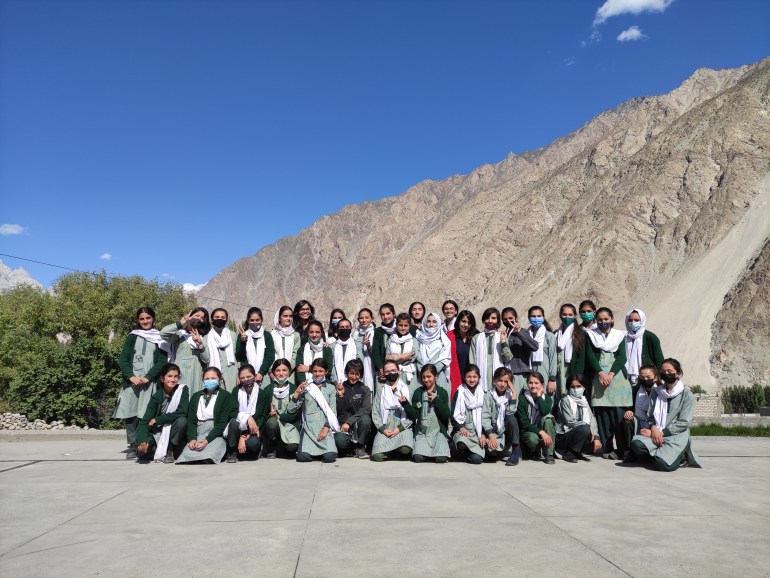
Sana and her sister Sumaira decided they wanted to work on increasing menstrual awareness among women in impoverished neighbourhoods. “Most well-off women in Pakistan have always had access to menstrual products, and even if there aren’t conversations about menstruation in their homes, they have never had to think about how other women may experience their period, especially if they do not have access to resources,” Sana feels. They founded HER Pakistan in May 2018, and worked with community leaders in neighbourhoods in Karachi to organise sessions for women to attend. The sessions would start with women covering their faces with a dupatta or being shy, but Sana and Sumaira were soon inundated with their questions on everything from domestic violence to marital rape.
They noticed that women would attend the sessions, but refuse to bring their daughters with them, or would send them out of the room when certain topics, like sex, came up. “They felt it would ‘corrupt’ their daughters,” Sana explains. “That’s when we realised we needed a school programme to educate girls about puberty, menstruation and sexual health.” They spoke with experts and organisations across the world doing similar work and put together a programme to discuss menstrual, sexual and reproductive health, including family planning and started school sessions in January 2019. Teachers stay in the classroom during HER Pakistan sessions. The goal, Sana explains, is for the schools to change how they think about menstruation. “We can’t just give a girl knowledge and awareness and expect it to help if her school does not feel like a safe space where she can be confident about her body or talk to her teacher if there’s a problem.”
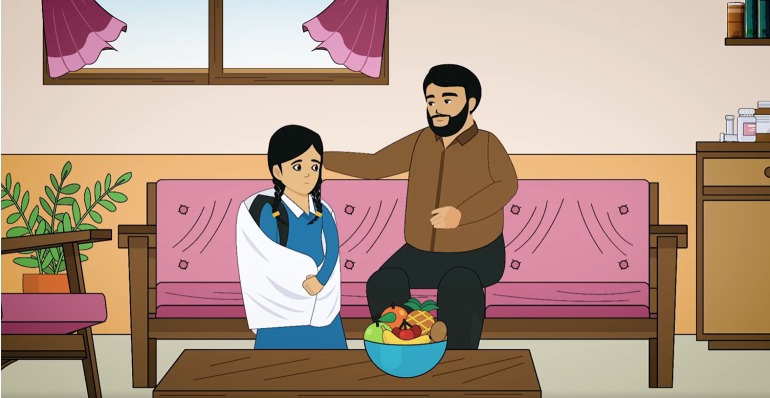
One of HER’s most popular segments in the sessions is an animated video series, Fatima and Baba. In three episodes, the girls watch as Fatima, who is motherless, learns about her period and how to manage it with the help of her Baba (father). It’s an example of HER’s approach. They never instruct the girls on what they should do – they simply enable them to question the norm. “We have to consider cultural and social sensitivities and we cannot have boys or male teachers in the classrooms during the sessions,” Sana explains. “Women do not talk to their fathers, husbands or brothers about their period. We’ll pretend to fast during Ramadan [women are excused from fasting when they have their periods] instead of admitting we have our period as we don’t want the men in the family to know. We just wanted to show the girls that it is okay to talk to men about periods, too – in fact, it should be the norm.” Sana thinks of her own father and how he has supported HER’s work. “My father has never used the words ‘menstruation’ or ‘pads’ in his life,” she says. “But he is the person who is now coordinating shipments of pads that we donated to flood-affected women or helping us pack kits for them.”
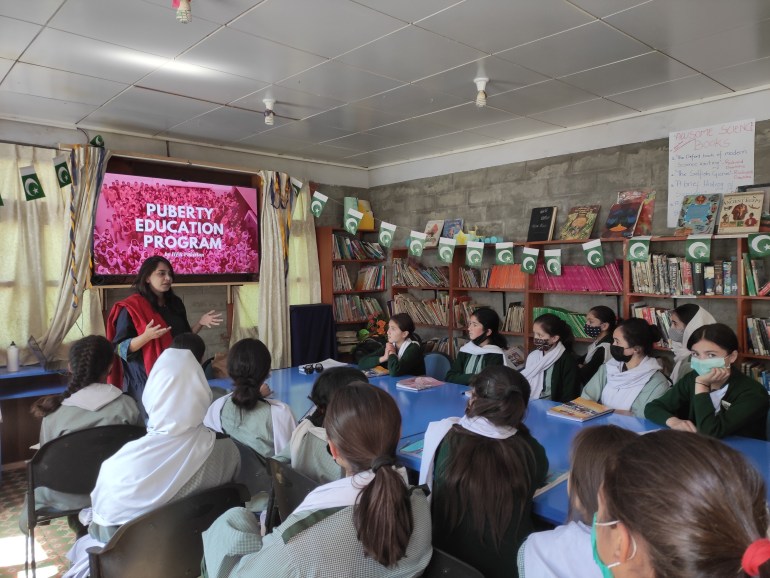
Quietly innovating
Speaking with those who work in the field of reproductive or menstrual health in Pakistan is speaking with innovators. They have had to be creative to continue their work in the face of societal and cultural barriers. There is the organisation whose workers found that when they visited women in their homes in low-income neighbourhoods, the in-laws would insist on remaining present during the visit. The women wanted contraceptives, but could not let their husbands or in-laws know. Workers learned to give the woman the contraceptive injection under the guise of a “vitamin shot”, to improve her health, they would tell the in-laws.
There are the two brothers, Imtiaz and Sikandar Rahman, who founded Santex, the first company to produce pads in Pakistan in 1983. With restrictions on the media and the taboo around menstruation, they could not advertise their product. An employee hit upon the idea of campaigns in schools, educating the girls about this new product and running lucky draw competitions – with prizes including gold chains – to encourage the use of pads.
Then there are the young women who work on menstrual health or awareness campaigns without their family’s knowledge, travelling the country and speaking with women to remove the stigma of a subject they cannot broach in their own homes. “If you work on reproductive health, abortion rights, birth control, or menstrual health, it brings a lot of shame to others in your life,” one woman told me. “You want to do the work but you do not publicise it. It brings unnecessary criticism and attention to you and your family.”
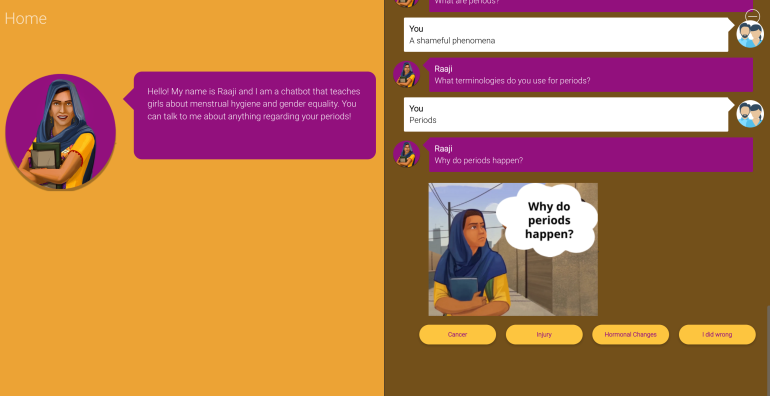
There are young women who work in femtech, like entrepreneur Saba Khalid, who conceived of Raaji, a chatbot to answer questions about periods. Initially, Raaji was open-ended, but Khalid quickly realised that it would be more productive to focus on common misconceptions and problems, as users, hungry for knowledge would ask the bot questions about all aspects of health. Raaji, which speaks Urdu and English, guides users through a series of questions that girls would often ask. The queries give you a sense of the cost of shame about menstruation: “My mother says I can’t have fish or milk on my period – is this true?” “Can I shower on my period?” “Can I attend a wedding or birthday or will I bring bad luck?” “Can I have sex when I have my period or is it dirty?”
Khalid’s organisation, Aurat Raaj, also works with “menstrual champions” in 500 villages in Sindh to spread awareness through “listening parties” and video chats with gynaecologists. The champions, women from within the communities who are trained by Aurat Raaj on basic menstrual health issues, invite the village’s women to group sessions where they can ask questions or share concerns.
Arbely, a 23-year-old woman in Baksh Gopang village has held listening parties for two years. She has grown up hearing women refer to their period as “mehmaan” (guest) or “kapray” (cloth). At her training session, several women were so uncomfortable that they left. “When the Aurat Raaj trainers asked us about our first period, I felt really shy and embarrassed,” Arbely recalled. “I told my mother when I got my period and the first thing she said was, ‘Don’t tell anyone.’ It signals to everyone that the girl has grown up. I think that is why they tell us to hide it.” The silence is a protective measure, granting the girl some time before she may be married off. The champions do not argue with women who insist that according to religious tradition, the girl must be married off when she hits puberty. They steer clear of such discussions as they do not want to be rejected by the community or place themselves at risk by arguing about religion.
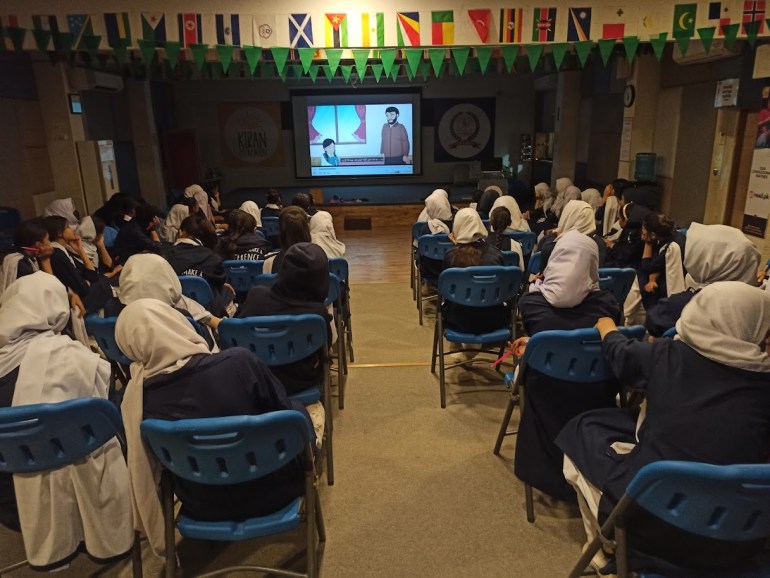
‘Most people want to confine women’
To date, HER Pakistan has worked with more than 110,000 women across the country. Even after all this time, Sana is still surprised by the lack of awareness among women and girls. “I am always surprised by how many teachers approach us with questions when we do the school sessions,” she says. HER’s five-person team covers the female anatomy, and while some schools have refused to allow the sessions because they’re nervous about how parents will respond to students receiving such information, others are keen to engage – and it’s not just the students. Sana has been approached by middle-aged women with children who have questions about their anatomy. Teachers are surprised and curious when products like period underwear or menstrual cups are shown in class.
In one school session in Balochistan, Sana was taken aback when speaking with a group of 200 girls. “More than half of the group did not have the word ‘menstruation’ or ‘mahwari’ in their vocabulary,” she says. “They did not know what it was. They did not have a word for something that happened to them every month.”
“What did the girls refer to their period as?” I asked Sana.
“That’s the thing – they just never referred to it,” she says. “They never talked about it with anyone. Not their friends or mothers. They just don’t talk about it.”
An Urdu word for “vagina” is “sharamgah”. A place of shame. When Sana considers the anger her poster at the Aurat March evoked or the criticism that Mahwari Justice encounters, she thinks of how the word “period” itself is considered so shameful that there are those who do not wish to ever say it. She thinks of the schools that are hesitant to host HER Pakistan sessions because they do not want the girls to discuss virginity, or the organisations that are nervous about funding their work as HER Pakistan discusses childbirth. HER, which receives international funding, has never been financially supported by a Pakistani organisation, according to Sana. The anger and shame is not about menstruation, she feels. “It’s about the female body. We don’t want to allow conversations about women’s bodies or what they need.”
The debate around providing women with period products during the floods was only the latest iteration of an issue that has existed for too long, Sana believes. “Most people want to confine women,” she says. “You don’t want to educate women about things like menstruation, and as a result, they are not able to perform to the best of their abilities. The woman stays indoors, stays preoccupied with how to manage something like blood flow. She will drop out of school. Isn’t that what we want? It could be a conversation about breastfeeding or pregnancy and we will still be angry about it. We don’t like the idea of women occupying public space and being present – that’s the real problem.”
*Name has been changed to protect privacy